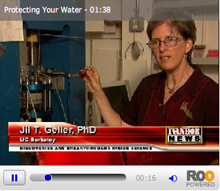|
|
A full listing of the Lab's activities is available on the |
|

|
|
Today
No Events Scheduled
Tomorrow
Noon
Yoga Club
Class with Inna Belogolovsky
Bldg. 70-191
Noon
Dance Club
Beginning Waltz
Bldg. 51 Lobby |
|
|
 |
|
| |
The cafeteria menu is not available due to the transition of services to Cal Dining. It will be posted within the next two weeks.
| Breakfast: |
6:30
- 9:30 a.m. |
| Lunch: |
11
a.m. - 3 p.m. |
| Cafe: |
6:30
a.m. - 7:30 p.m. |
| |
|
|
|
 |
|
 |
Study of Comet at ALS
Rules Out ‘Q-Phase’
Longtime Advanced Light Source users like Saša Bajt of Lawrence Livermore Lab seek clues to the origin of the solar system by analyzing samples of Comet Wild 2 returned by NASA's Stardust mission. Working with Michael Martin, also with the ALS, on infrared beamline 1.4, Bajt focused the latest results, in the Jan. 4 Science, by ruling out the "Q phase" as the source of the comet's noble gases. University of Minnesota's Robert Pepin, lead author, told Bajt, "The Q-carrier of the gases in meteorites is known to be organic, and there are essentially no organics in our samples, so the only possibility left is the grains themselves." Go here for more information.

|
 |
|
 |
Benefits Administrator
Has Problem with Cards
SHPS, the administrator of Flexible Spending Accounts (FSAs) for the University of California’s health benefits plan, has reported a problem with its HCRA (Health Care Reimbursement Accounts) spending cards. Employees may not appear in the database as having an available balance when they try to use their HCRA spending account cards to pay for qualified expenses. Thus the card transactions will be denied. SHPS has indicated that this problem is limited to continuing enrollees (those who were enrolled in 2007 and 2008). It estimates that once the problem is identified, corrections will be made, perhaps as early as tonight. In the meantime, participants can pay cash for their expenses and file a paper form for reimbursement. Go here for the SHPS website.
 |
 |
|
 |
|
 |
|
 |
|
Geller |
|
Using Seismic Waves
To Protect Water Supply
The same seismic waves picked up by a seismometer during an earthquake now have a new use — finding problems at the source of your drinking water. Scientists are using the instrument to look for trace amounts of the cancer-causing contaminant trichloroethylene. “If we inject a liquid contaminant, will we see it change in the signature of the acoustic or seismic wave?” asks Berkeley Lab earth scientist Jil Geller. That change in the returned seismic wave reveals the exact location of the contaminant — even if it is only microscopic amounts. A video report of this research is available here.

Technology Helps Tap Geothermal Stores
Geothermal energy is a largely untapped resource because, in the absence of a volcano or hot springs, it's hard to find the right spot to tap into the resource. Mack Kennedy, with Berkeley Lab’s Earth Science Division, coauthored a report showing that the ultra-sensitive detection of traces of helium at the surface using mass spectrometers may hold the key to sniffing out the best sites of this hidden heat. Full story. An article on this topic also appeared in the news section of the Department of Energy’s Energy Efficiency and Renewable Energy website.

Smoot on Hand to Launch
Hawking Cosmology Center
The Center for Theoretical Cosmology, an “international hub” that will draw together cosmologists young and old to answer the big questions of the universe, was recently launched at the University of Cambridge in the United Kingdom. The center is being funded by the Stephen Hawking Trust Fund. Berkeley Lab physicist George Smoot provided some brief words during the dedication on Dec. 19. Smoot recently launched his own cosmology center at UC Berkeley. Full story.
 |
 |
|
|
|
 |
Rain, Wind Hitting Lab; Caution Urged
This morning's strong winter storm is creating transit and isolated flooding problems at Berkeley Lab, and employees on site are cautioned to be especially careful when traversing the roads and walkways. As of 9 a.m., reports of tree limbs threatening to fall -- the walkway from the main Bus Shuttle stop at Building 65 to Building 50 has been taped off -- and a lower yard gate at Building 85 temporarily dislodged from its tracks when hit by a falling tree are the only major hazards reported. Debris covers all thoroughfares, roads and paths are slick, and drivers are urged not to depart the Lab via the Grizzly Peak route, due to dangerous winds and potential flooding. Current status reports will be updated here and via the "Weather Advisory" link on the home page. Call the Work Request Center at x6274 to report hazards or problems.

|
 |
|
 |
|
|
|
|
|
 EMERGENCY INFO EMERGENCY INFO |
 |
Emergency: Call x7911
Cell Phones: Call 911
Non-emergency Incident Reporting: Call x6999
SECON level 3
More Information |
 |
|
|
 |
|
|

